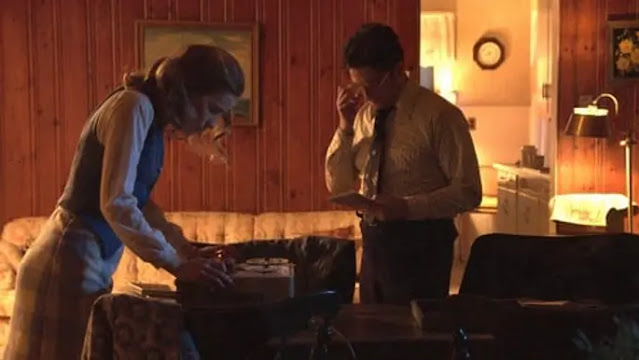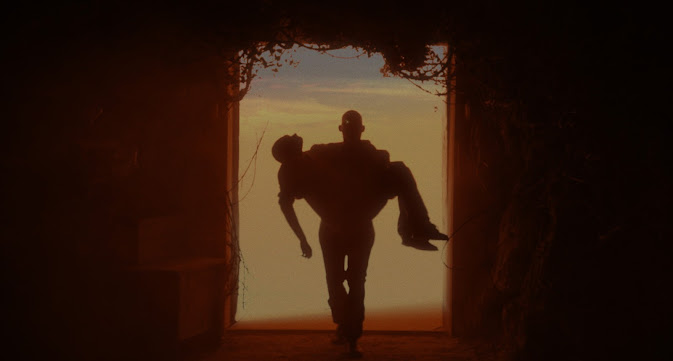Time to run down the 13 films I saw at this year's Revelation Film Festival. It was a great edition for the 25th anniversary, with some excellent films on show. Here are my thoughts, in ascending order of quality.
After Blue ★
This was quite hard going. It reminded me of struggling through Aleksei German's impenetrably muddy Hard to Be a God (2013). After Blue shares much of that film's aesthetic, with amateur looking sets, foggy darkness and animalistic performances. Director Bertrand Mandico is one of the creators of the Incoherence Manifesto and it certainly shows in this film, which follows a young woman and her mother on the hunt for wanted killer, Kate Bush (not that one). It's set on a planet peopled only by women (the men have died off after growing hair internally) and the story, if you can call it that, sends the mother and daughter to a mountain lair and back again. There are worthy feminist and environmental messages here but I didn't have the stamina to wade through all the guff and piffle.
18½ ★★
This is a nice idea in the wrong hands. The premise is that a transcriber, Connie (Willa Fitzgerald), has somehow got her hands on the missing 18½ minutes of the Nixon White House tapes that might have implicated him (more) in the Watergate scandal. She meets Paul (John Magaro), a journalist, who wants to listen to the tape before deciding the next move, so they go to an off-season holiday park on a lake. Hijinks ensue, and I hate writing that, but I feel that's what the director, Dan Mirvish, is angling for. He's trying to set the film up as a low-key, almost grungy indie pic that goes a bit zany, and Richard Kind is the best thing in it as the slimy, one-eyed park owner but the whole film is tonally haphazard. Maybe that's what they were going for - unfortunately, it doesn't work.
Slaughterhouse-Five ★★
Kurt Vonnegut's big breakthrough as a writer got Hollywood on the sniff and a few years after the book was published this adaptation was made. Oddly lacking in star wattage (you'll recognise some faces from 80s TV) yet directed by the esteemed George Roy Hill (
The Sting,
Butch Cassidy and the Sundance Kid, Slap Shot), this is could have been great but it hasn't aged well. It's very earnest and avoids the kooky, and I reckon it must be a tough gig to adapt Vonnegut. As solid as Hill was, it might have been better waiting for peak Gilliam or even Jeuent & Caro to direct.
Luzifer ★★½
I have mixed feelings about this film by Austrian Peter Brunner. On one hand, there's a creeping embedded dread (it makes sense that Brunner was a student of Michael Haneke) and the stakes are laid out succinctly. On the other hand, there are a couple of scenes that are excruciatingly repetitive and could have done with minute shaved off. There's also a surfeit of religious imagery and dialogue, which was hard to stomach, considering the fundamentalist mother and son were portrayed as the heroes, railing against the devil in the guise of modernity. Not for me thanks, Clive. And on the other hand (yep, three hands), I thought the lack of a traditional revenge climax was a neat little rug pull. So, conflicted I remain.
The Passengers of the Night ★★★
This is an assured, slightly overlong look at a French family in the 1980s, mainly focused on Charlotte Gainsbourg's single mother of two. There's joy and melancholy in equal measures and the characters feel real, albeit French (so I can't really speak for the veracity of that comment). Gainsbourg's Elisabeth has just split from her husband and needs to provide for her two (near-adult) kids. The fact that the film doesn't really dwell on this point - her radio job pays next to nothing and her father is good for a loan - says a lot about its non-genre credentials. This is fine and apes the kind of dreamy, wistful French dramas of the post-New Wave (see Eric Rohmer mainly, but also maybe Patrice Leconte, Jacques Rivette and Claude Berri). The downside of all this is the meandering path the film takes, and while it's interesting to spend time with the leads, the lack of focus pulls the film down a bit.
Kurt Vonnegut: Unstuck in Time ★★★
This doco had a long gestation period with writer/director, Robert Weide finishing it around 40 years after devising the idea. It covers Vonnegut's life, from his childhood up to his death in 2007, and is framed by Weide's friendship with the author. I guess the pivot point of the film (and Vonnegut's life) was his time in Dresden during the firestorms - this shows in his writing and his general fatalism about the world. He's a witty bugger and Weide does a fine job of illustrating Vonnegut's mild anti-establishment bent, as well as the effects he had on those around him - family and fans alike. A pretty good doco about a pretty great author.
Shadow ★★★
Based on a play - The Shadow Whose Prey the Hunter Becomes - this is a clever film, made by the Geelong-based, Back to Back theatre group. The cast are mostly neuro-diverse and the point of the film is to show how utterly normal they are, or that, in the words of Simon Laherty (above), "normal people aren't really normal." Shadow begins by showing some people with intellectual disabilities (this term is challenged during the film) setting up a mock city council meeting. We discover later that the reason for the meeting is to discuss Artificial Intelligence and how it will treat humans in the future. The comparison with how the neuro-diverse are treated by the rest of society is duly noted. A thought-provoking, original treat.
A Life on the Farm ★★★
Here's a life and death affirming doco about an old Somerset farmer, Charles Carson (above) who loved to pootle about with camcorders. The director, Oscar Harding (whose grandparents were neighbours of Carson), found an old VHS tape in his auntie's stuff and, realising the gold he had uncovered, made it into this film. This nutty but lovable old geezer liked to film events around the farm, often set up - like the cardboard skeletons riding cows, sometimes natural - like the calf birthing sequence. His hobby, his passion, I'm guessing, helped him deal with loss and grief and he seems to have coped with life events in a very nonchalant way. The old VHS film clips are interspersed with interviews of people who knew Charles and others who have a fascination with his output. The moment with the cat early on will set you on the path. [Listen to my interview with the producer, Dominik Platen
here].
The Assassination & Mrs. Paine ★★★½
This is a tricksy number whereby the director, Max Good, pushes us in one direction, then pulls in another, all hovering around the inscrutable character of Ruth Paine. One view has her as the innocent patsy who gave Lee Harvey Oswald a roof over his head the night before JFK was assassinated. Another paints her as a CIA agent, deep undercover in order to infiltrate communist sympathiser groups. Whichever the case, Mrs. Paine certainly carries herself with incredible dignity, given that she's had this shit hanging over her for so long. Apparently she was asked the most questions in the Warren Commission Report - in the tens of thousands! - and is badgered every few years by journos for an updated soundbite. It's a fascinating side angle to the tale that will likely never reach exhaustion and the threads are plaited and unpicked again and again. Top grade doco.
Namarali ★★★½
This doco was shot some time ago in the Kimberley region of Western Australia and it follows indigenous Aussie artist Donny (Yorna) Woolagoodja as he makes his way to a cave to repaint the big boss Wandjina (spirits), Namarali. Director, Tim Mummery, weaves together images of the artist and the landscape with stock footage from a film Donny's father made in 1972, bringing some neat symmetry to the journey. But the journey's end isn't a conclusion as such, as the Namarali will need to be 'buffed up' for each new generation, and that's the message of the film for me. The forcible removal of Donny and his Worrorra people from the area meant that the upkeep of Namarali was paused for a long while, and though this doco (no spoilers) ends on a positive note, the future of the cave, the art, even the culture, is sadly uncertain. A tightly made bittersweet film.
Planet X ★★★½
Well, well, this kind of thing doesn't come along every day. I'm not sure how the director, Maxence Vassilyevitch avoided turning this into a vainglorious French art film, there's potential for high levels of toss here, but he's somehow made this a success. Perhaps the short run time, maybe the surprising spot it ended on, possibly the economy of words and shots, but this was very nearly the best of Rev for me. [See full review
here for more].
Navalny ★★★½
In August 2020 Alexei Navalny, Russian opposition leader and Putin chassis thorn, was travelling by plane back to Moscow from Tomsk in central Russia when he fell suddenly ill. It turned out to be nerve agent novichok, in the crotch of the grundies, no less. Jock Crotch Novichok might be a good name for a death metal band, but it almost proved fatal for Navalny. The plane deviated course and he was taken to hospital, likely saving his life. The wash-up of this act is the basis for this gripping documentary from director, Daniel Roher. Eventually gaining release from the hospital (it was a close run thing), Navalny is transported to Germany where he starts his recuperation. Soon, Bulgarian investigative journalist, Christo Grozev, contacts Navalny with news that the illness was possibly poison and so begins their investigation.
This doco is packed with impressive moments, mostly courtesy of the uber-charming Navalny. His description of Christo as a 'Bulgarian nerd with a computer' and his delicate ribbing of his wife's desire to steal an apple are worth the ticket alone. However, the showstopper is the scene where they attempt to cold call Russian agents who may have been involved in the poisoning. It's enough to say that this is a piece of extreme fact that could easily pass as dubitable fiction. In more 'fact or fiction?' posers, Putin himself is seen at a press conference referring to Navalny as 'that individual' or 'the person you are talking about' and other such 'he who shall not be named' blatherwick, clearly missing the Voldemort angle. I mean, Peter Dutton sure, in fact, find a fucking mirror Poots, but Navalny is clearly 'the boy who lived' in this scenario. Unless, of course, they end up killing the poor bastard (he's in a Russian prison at time of writing). A brilliant documentary.
Freaks Out ★★★★
Gabriele Mainetti's second feature is a hard-edged, warm-centred treat, mixing Nazi clairvoyants with Italian circus freaks. And amputee partisans. And super powers. In war time Rome. If this hasn't tickled your fancy, pop through to the full review here. A barrel of fun, best of the fest for me.
MILD SPOILERS IN POD!
























